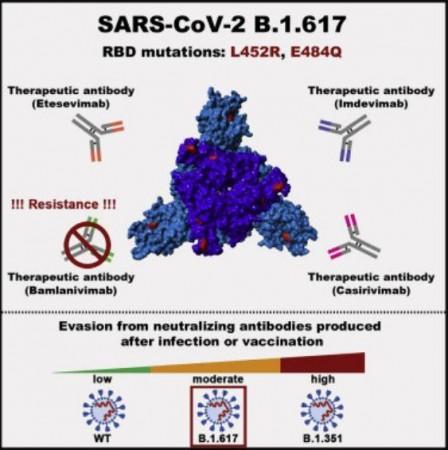While our drastically altered lives due to the COVID-19 pandemic appear to remain unchanged for the foreseeable future, the SARS-CoV-2 virus is evolving at an unprecedented rate. Some of these mutants—such as variants of concern (VOCs)—are more potent than the original virus.
Along with being highly transmissible, they can evade the immune defenses acquired either through infection or vaccination. One such VOC is the Delta variant (B.1.617.2). Now, scientists report that this variant is completely resistant to an antibody used to manage COVID-19 and can effectively evade others.
According to the multi-institutional study, the Delta variant, which was previously known as the Indian variant, is fully resistant to the therapeutic antibody bamlanivimab. Other antibodies were found to show insufficient inhibiting action against the variant. It was also observed that the variant can infect certain intestinal and lung cell lines more effectively than the original virus that arose in China. The study was published in the journal Cell Reports.
"The protective effect of antibodies is limited because they block the cell entry of B.1.617 less efficiently than that of the original virus. As a result, individuals who are not fully vaccinated or were infected a long time ago and thus produce low amounts of antibodies, may be poorly protected against infection with the B.1.617 variant," said Dr. Markus Hoffmann, lead author of the study, in a statement.
A Mutant of Concern

Viruses such as the novel coronavirus mutate over time as they circulate among different populations. As the SARS-CoV-2 virus replicates within cells, certain errors may develop within its genetic composition. This results in its mutation. While some of these acquired alterations are of no consequence, others let it evade immune responses, while some variations make them more transmissible or infectious.
VOCs are known to possess mutations that endow them with both immune evasion and lethal transmissibility. Currently, four variants of SARS-CoV-2 have been declared as VOCs by the WHO—Alpha (B.1.1.7- UK), Beta (B.1.351- South Africa), Delta (B.1.617.2- India), and Gamma (P.1- Brazil). The Delta variant emerged in India in late 2020. It is widely believed that the devastating second wave which struck the country in early 2021—leading to extensive loss of lives—was on account of this variant.
Most of these mutations have occurred on the 'S- protein' or 'spike' of the SARS-CoV-2. The spike is a protein structure on the surface of the virus that helps it invade human cells. Particularly, most of the spike mutations are located in the RBD (receptor-binding domain) region. The RBD is the site where the spike docks or binds with a cell. B.1.617.2 variant possesses eight mutations on its spike, including two crucial ones known as E484Q and L452R within the RBD. It has been reported that this mutant has become the dominant variant in several countries.
Evading Immune Responses Easily

Through the study, the team aimed to ascertain how the mutations of the Delta variant affected its capacity to enter host cells and how effective the antibodies obtained through infection and vaccination were in blocking the variant. In the first step, the scientists examined the entry mechanism of the B.1.617 variant into various human cell lines. It was learnt that in two cell lines—derived from colon and lungs—there was a 50 percent increase in the pathogen's ability to enter cells.
Next, the efficacy of four antibodies (bamlanivimab, casirivimab, etesevimab, and imdevimab) that have received approval for the treatment of COVID-19 was tested against the Delta variant. The researchers found that the variant was completely resistant against bamlanivimab, while it was less inhibited by the others. Finally, the authors investigated the efficiency of antibodies isolated from the blood of individuals who had either been vaccinated or had recovered from COVID-19. Alarmingly, a two- to threefold decrease in the protection against the Delta variant was found.
Highlighting the need to address the variant's immuno-evasive abilities, Dr. Stefan Pöhlmann, lead author of the study, said: "In order to prevent further spread of the B.1.617 variant, especially its subtype Delta, and to prevent the emergence of new virus variants it is advisable to quickly achieve full immunization of all people that are willing to be vaccinated. It is also necessary to investigate whether booster vaccinations with existing vaccines or vaccines optimized to target variants provide long-lasting and broad protection."

















